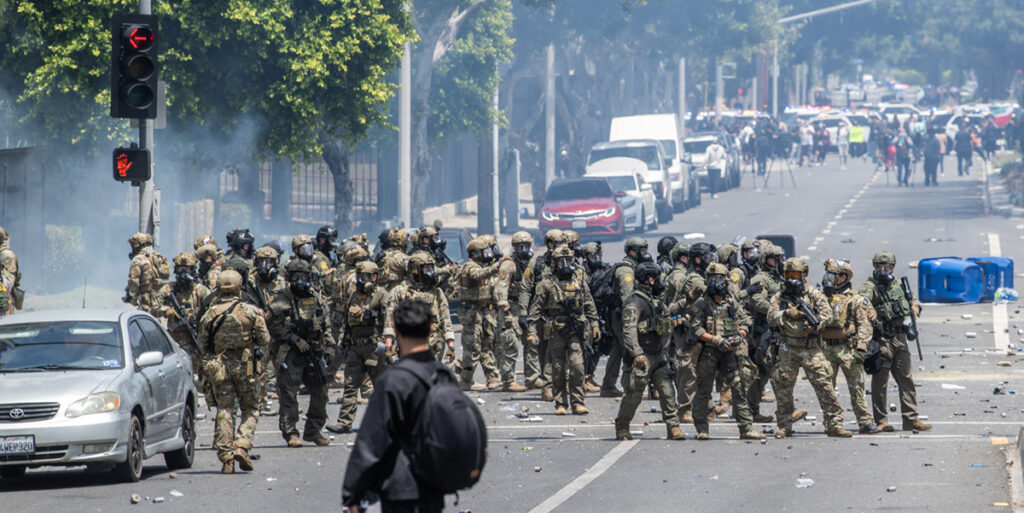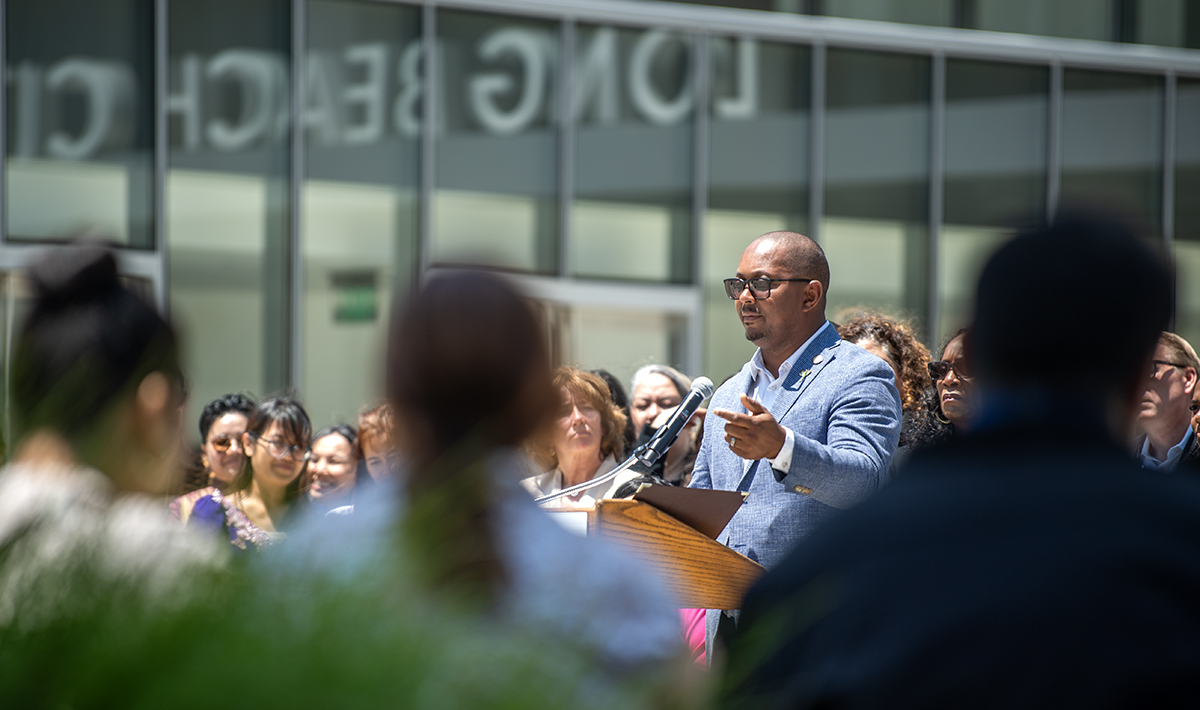Long Beach announced a raft of plans Friday that signify an escalation in how the city is combating the Trump Administration’s recent immigration raids. They include an emergency cash fund for reeling families and joining a lawsuit that seeks to limit the scope of sweeping deportation operations by federal agents.
The announcement was wide-reaching but with sparse details of who will be eligible and how soon families can expect assistance. Other items will be explored in the city’s 2026 budget talks, set to start next week.
Here are some of the top takeaways from Friday’s announcement:
The city will join a major lawsuit
Following a brief closed-door meeting with the City Council, Mayor Rex Richardson and the council said they will join a federal lawsuit filed earlier this month by the American Civil Liberties Union.
The lawsuit is one of the main legal fronts against the raids.
It accuses the Border Patrol and Immigration and Customs Enforcement Agents of unlawfully detaining people nearly at random, based on little more than their skin color or accent. Last week, the judge issued a temporary restraining order barring agents from detaining people without reasonable suspicion beyond their race, ethnicity or occupation. The government is appealing her ruling, which remains in effect for now.
The city and county of Los Angeles, Paramount, Santa Monica, Culver City, Pico Rivera, Montebello, Monterey Park, and West Hollywood have also said they will seek to join the litigation. A judge has not decided yet if they can.
“As the second largest city in LA County, Long Beach is proud to throw its full weight behind this effort,” Richardson said.
This comes as immigration raids across the region enter their second month. Immigration attorneys and aid workers say undocumented residents are petrified into staying home, skipping church and doctor’s appointments as federal agents converge in the early mornings on street corners, car washes, home improvement stores and majority-immigrant neighborhoods.
Many say they’re scared to go to work, as they weigh the necessity of collecting a paycheck against the risk that they might be arrested and deported.
“This administration has done nothing but instill fear, and this is why I call on every city in this state to protect our immigrants who contribute to our country,” said Long Beach Councilmember Mary Zendejas.
An immediate fund for immigrant families in need
In the spirit of those concerns, the mayor also announced Friday that the city would begin soliciting donations to a fund that provides assistance for people who have been affected by deportation proceedings.
The aid program, titled the Long Beach Neighbors Supporting Neighbors, will include rental assistance, food distribution, income replacement and legal support for immigrant families.
Flanked by the city council, business leaders, union stewards and activist organizations, Richardson said the announcement was a collaboration of varying minds and backgrounds.
The money will be distributed through the California Community Foundation, which teed it off with a $100,000 contribution. The foundation, Richardson said, will dole out funds to select “community-based organizations” in the city. It’s unclear when financial assistance will be available or how disbursements will be made.
Peter Hong, a CCF spokesperson, said in an email Friday that the Foundation will soon start distributing grants to nonprofit organizations in Long Beach “as donations come in.” Those nonprofits will then distribute aid.
“We expect the organizations selected will already have relationships with people in need because they are already supporting them, are trusted, and know how to get word out in the community that they are there to help,” Hong said.
Similar programs have sprung up in cities with prevalent Latino communities, including Carpinteria, Montebello, Anaheim and Santa Ana. Both the city and county of Los Angeles have respective funds as well, both fueled by philanthropy.
Paramount, an early flashpoint of conflict in the first week of the raid, recently announced that it would launch its own program, using $60,000 of city funds to help cover the $100,000 initiative. The money will go through a local organization that will provide people with a questionnaire to see if they qualify, as well as a city food bank with experience in doling out goods to people in need.

Peggy Lemons, mayor of Paramount, said the fund was an obvious remedy for their city of 52,000 — 82% of whom are Latino. City officials there say residents are simply not leaving their homes, and “food supplies are running low.”
“I just think about the human suffering and couldn’t sit back and do nothing,” Lemons said in a call Thursday. “It all goes beyond immigration, … and I don’t know why anybody in this country would be comfortable letting that happen.”
A legislative package in the 2026 budget
Richardson also announced that he will include a legislative package in his proposed 2026 city budget. This will include direct cash assistance and money for legal defense against deportation through the existing Long Beach Justice Fund.
“Because in this moment, let’s meet the vision with unity. Let’s meet fear with faith. Let’s meet cruelty with compassion. Let’s meet chaos with courage,” Richardson said.
Without an operator currently selected for the Justice Fund — the Immigrant Defenders Law Center is no longer a city provider — it’s unclear who would use the money for legal services. Richardson said there is currently a request for proposal to find their replacement.
Gaby Hernandez with the local immigrant rights group ÓRALE, Romeo Hebron with the Filipino Migrant Center and Susana Sngiem of the local nonprofit United Cambodian Community each took time at the podium to ask for $2.2 million to be allocated in the upcoming budget for the Justice Fund.
As of last week, federal officials say they have arrested more than 2,792 people in the Los Angeles area since June, according to a statement. Of those, at least 10 have come from Long Beach, according to a tally kept by ÓRALE.
Data from the federal government shows that the majority of people arrested by ICE have no criminal history.

